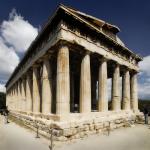|
This section contains 281 words (approx. 1 page at 300 words per page) |

|
Circa 625-Circa 547 B.C.E.
Philosopher
Mystery. Thales of Miletus lived and worked in the prosperous port city of Miletus on the coast of Asia Minor. Tradition credits him with a variety of ingenious solutions to practical problems, but Thales left no writings to posterity. Much of what is known about him comes from Aristotle, who regarded him as the first real phusiologos or natural scientist. Thales held that water was the basic building block of all matter.
Achievements. Thales allegedly visited Egypt, where he is supposed to have learned geometry, studied the rise and fall of the Nile, and determined the height of pyramids by measuring their shadows. He is said to have designed a canal that split the deep Lydian river Halys in two, diverting some of its flow into another channel so that the army of Croesus could safely cross it. His prediction of...
|
This section contains 281 words (approx. 1 page at 300 words per page) |

|



